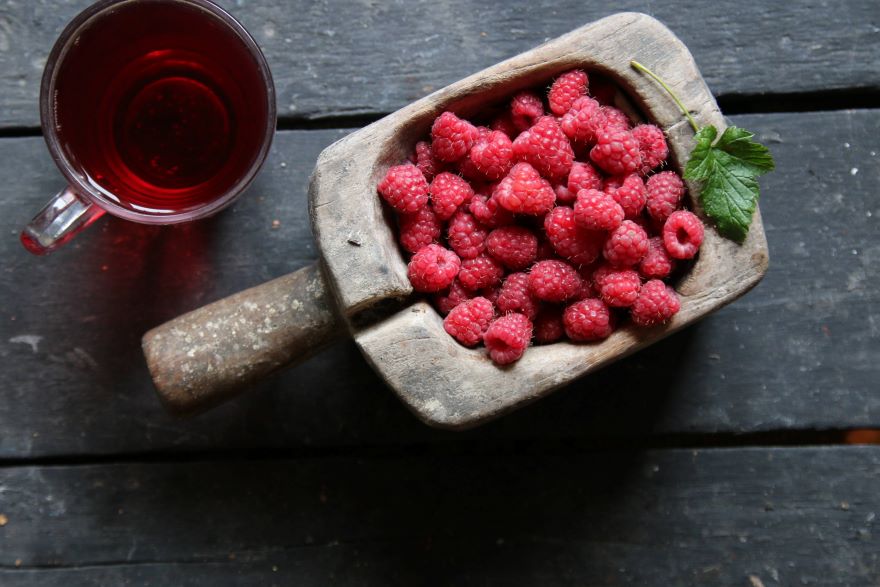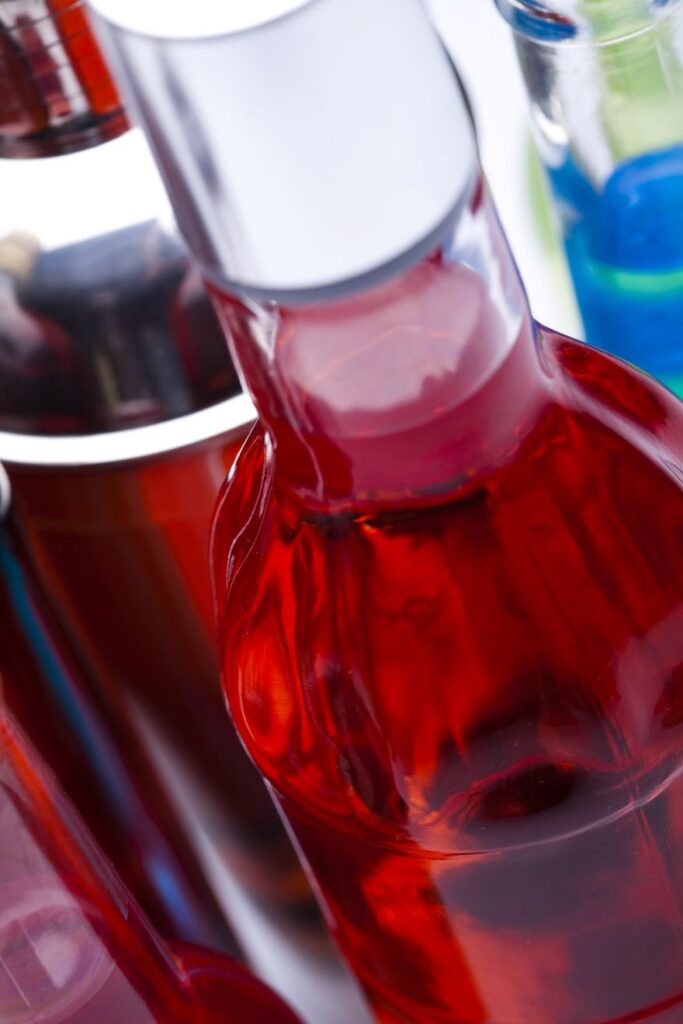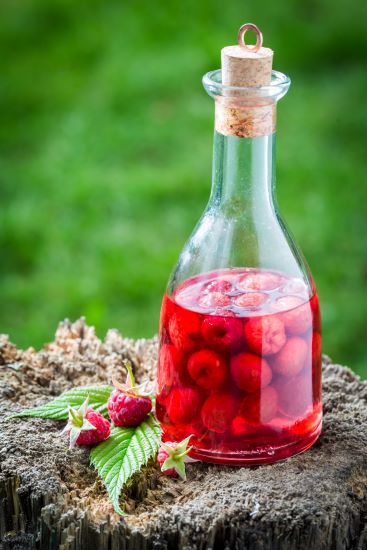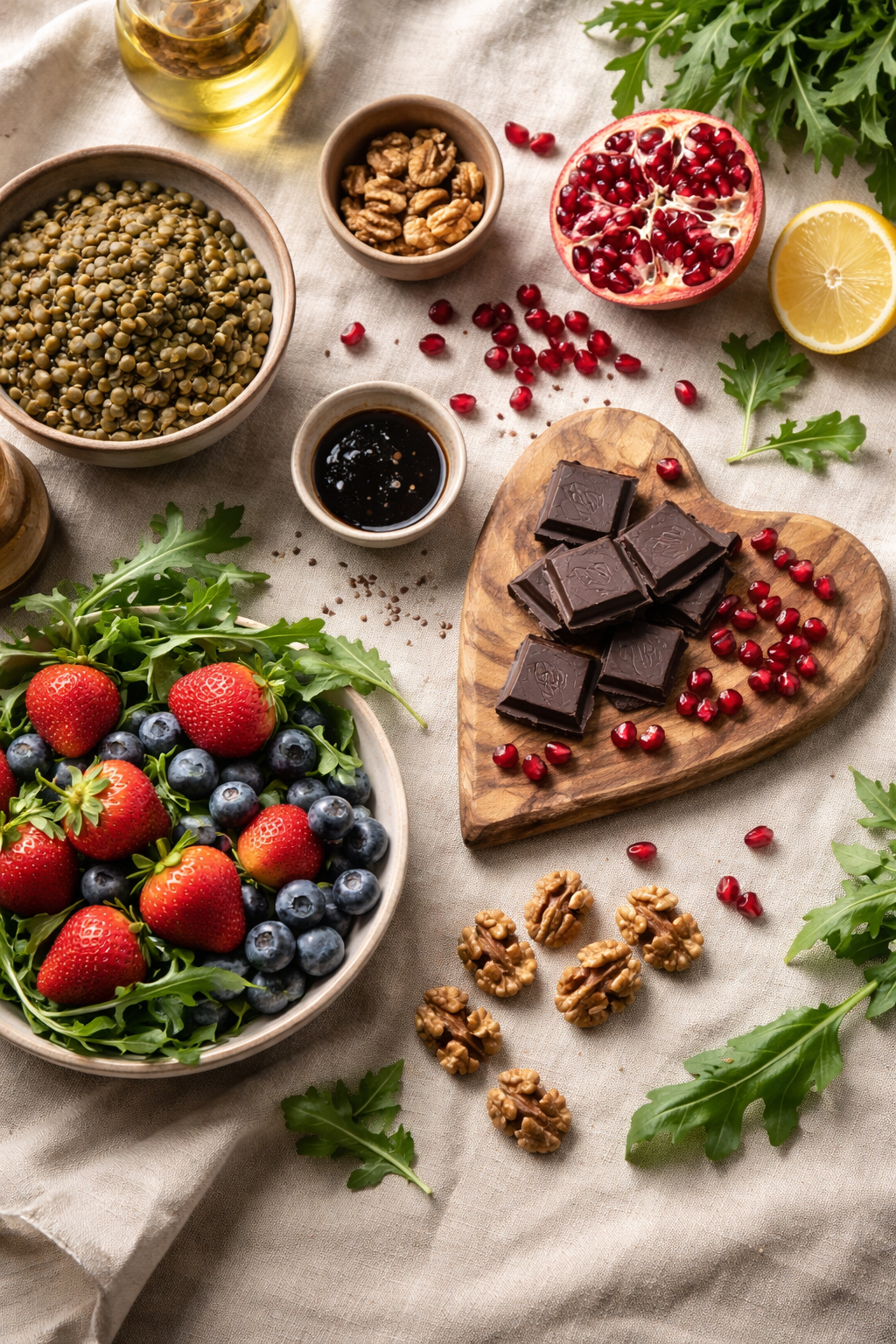Make raspberry vinegar by infusing white wine vinegar with fresh raspberries for versatile use in sweet and savory recipes.. Raspberry vinegar’s vibrant ruby hue and tangy taste enhance many dishes.
Creating raspberry vinegar at home is a simple process involving a few ingredients and some patience. Make raspberry vinegar by combining raspberries, vinegar, and sugar, and allowing the mixture to infuse. Strain the raspberry vinegar after infusion and store for future use in cooking, salads, sauces, and marinades.

Key Takeaways
- Raspberry vinegar adds a tangy flavor and beautiful color to various dishes
- To make raspberry vinegar, use fresh raspberries, vinegar, and sometimes sugar and make it easily at home.
- Use the vinegar in cooking for salads, sauces, and marinades to enhance taste, presentation and aroma
Raspberry vinegar is a versatile and flavorful condiment made from raspberry juice, vinegar, and sugar. Culinary applications of the vinegar include its use in salad dressings, marinades, and even beverages when diluted with water.This tangy and delicious substance is sure to add a unique flair to your dishes.
History and Origin
People have been experimenting with different ways to preserve food and enhance flavors since ancient times, and the concept of fruit-infused vinegars can be traced back to that period.. Raspberry vinegar, in particular, has its origins in European cuisine, where it became a popular addition to both food and drinks. Its distinct flavor profile and numerous applications have allowed the vinegar to stand the test of time.
Nowadays, there are various methods of producing the flavored vinegar. One such method involves the fermentation of raspberries along with bacterial strains that have low biogenic amine production in wine. This process not only creates a unique flavor but also results in a safer and more stable product for consumption.
Throughout history, people have used raspberry vinegar in various ways, including as a component in salad dressings, marinades, and even as a refreshing drink when diluted with water. Its versatility and unique flavor profile have made the vinegar a well-loved condiment that continues to find its place in both traditional and contemporary cuisine.
In summary, this flavored vinegar is a delicious and versatile condiment, with a rich history and diverse applications. As we continue to explore and experiment with this tangy substance, we will undoubtedly uncover more delightful ways to enhance our dishes and satisfy our palates.
Benefits of Raspberry Vinegar
Nutrition and Health
Raspberry vinegar offers several health benefits, primarily due to its antioxidant properties. Antioxidants protect our cells from damage caused by harmful molecules called free radicals, contributing to overall health and potentially reducing the risk of chronic diseases. In addition, this vinegar has anti-inflammatory compounds that can help combat prolonged inflammation.
An essential aspect of raspberry vinegar nutrition is the presence of fiber and vitamin C. Fiber supports our digestive health, while vitamin C is vital for our immune system, skin health, and much more. Some studies suggest that the vinegar may even have potential cancer-fighting properties due to its high antioxidant content.
Culinary Uses
We can use raspberry vinegar in various ways to enhance dishes with its unique sweet and sour flavor. A popular use for this vinegar is in salad dressings, where it adds a tangy boost. It can also act as a condiment or flavoring agent in other recipes, adding depth and complexity to sauces, marinades, and reductions.
By incorporating this vinegar into our meals, we not only enjoy its delicious taste but also benefit from the valuable nutrients and health-promoting properties it offers. The versatility and nutritional benefits of vinegar make it an excellent addition to our culinary repertoire.
Making Raspberry Vinegar At Home
Ingredients Required
To make homemade raspberry vinegar, you will need the following ingredients:
- Fresh raspberries
- White wine vinegar
- Sugar (optional)
These ingredients are essential for creating a delicious and versatile vinegar that can be used in various recipes, including salads, marinades, and sauces.
Step by Step Method
- Prepare the raspberries: Rinse the fresh raspberries thoroughly, and let them air-dry on paper towels.
- Combine ingredients: Place the clean raspberries in a sterilized bottle, ensuring there’s enough room to add the vinegar and sugar.
- Create the vinegar mixture: In a large saucepan, combine white wine vinegar and sugar. Heat the mixture over low heat, stirring constantly until the sugar dissolves. Make sure not to let it boil.
- Add the hot mixture to the raspberries: Carefully pour the hot vinegar mixture over the raspberries in the bottle, covering them completely. Secure the bottle with an airtight lid.
- Let it steep: Allow the raspberry vinegar mixture to stand at room temperature for at least 48 hours. This process will help the flavors to meld and develop.
- Strain the mixture: After 48 hours, use a cheesecloth to strain the mixture into a clean container, separating the raspberry pulp from the liquid.
- Bottle and store: Transfer the strained raspberry vinegar into a sterilized bottle, sealing it tightly to preserve the vinegar’s freshness and flavor. Store it in a cool, dark place, away from direct sunlight and heat.
- During the canning process, be cautious of mold and other contaminants that may compromise the quality of your homemade vinegar. By using sterilized bottles and following proper canning procedures, you can create a safe and delicious vinegar to enjoy in various recipes.
Storing and Preserving Raspberry Vinegar
Raspberry vinegar is a delicious and versatile ingredient that can elevate various dishes. To ensure its flavor and quality remain intact, proper storage and preservation techniques are essential. In this section, we will share some tips on how to store and preserve your flavored vinegar effectively.
Before storing the vinegar, we recommend straining it using a sieve to remove any raspberry seeds or pulp. This step ensures a smooth, clear liquid that is easier to store. Once the vinegar has been strained, choose between glass jars or bottles for storage. Glass containers are ideal since they preserve the flavors well and prevent any chemical reactions with the vinegar.
When selecting a location for storage, choose a cool, dark place, such as a pantry or a cupboard, away from direct sunlight and heat sources. Exposure to light and heat can alter the flavors and spoil the vinegar. Keeping the containers tightly sealed also helps preserve the flavor and prevents contamination.
If you intend to use the raspberry vinegar regularly, consider storing a small amount in your refrigerator. The chilled environment keeps the vinegar fresh, and having it readily available encourages you to incorporate it in your dishes more frequently. However, it’s crucial to note that, if refrigerated, the vinegar should be used within a few months as the flavors can deteriorate over time.
In summary, proper storage and preservation of raspberry vinegar involve straining the vinegar, utilizing glass jars or bottles, and keeping it in a cool, dark place. By following these steps, your vinegar will maintain its delicious flavor, and you can enjoy it in various culinary creations.
Raspberry Vinegar Uses in Cooking
Salad Dressing
Raspberry vinegar can elevate your salads to the next level! It is an excellent base for salad dressings, as it combines the fruity essence of raspberries with the tang of vinegar. To create a delicious vinegar dressing, mix it with oil, a sweetener, and herbs. For some extra flavor, add some finely diced red onion, a splash of rapeseed oil, and pinch of salt and pepper. A raspberry vinegar dressing will complement most green salads and bring out their natural flavors, making them more vibrant and refreshing.
Marinade Mix
We can’t forget about using vinegar in marinades! This versatile ingredient can be mixed with other components to create a flavorful marinade for chicken, beef, or even vegetables. For a delicious and simple chicken marinade, combine the flavored vinegar with honey, soy sauce, minced garlic, and a bit of cornstarch mixed with water. This will help thicken the sauce, creating a beautiful glaze when cooking the chicken. Marinate your chicken overnight in the fridge, ensuring it’s well coated before cooking. The result will be a tender, juicy, and flavorful dish that everyone will love.
Raspberry Vinaigrette
Making a raspberry vinaigrette is a great way to incorporate this vinegar into your cooking. To create a restaurant-worthy raspberry vinaigrette, start by blending fresh raspberries with your vinegar, creating a thicker mixture to serve as the base. To this mixture, add some red wine vinegar for added depth and tang. Then, simply mix in some olive oil, honey, salt, and pepper to taste. Before using it, strain the vinaigrette through a fine-mesh strainer to remove any raspberry seeds and ensure a smooth consistency. Drizzle the raspberry vinaigrette on salads or use it as a dipping sauce or marinade for various dishes.
In summary, raspberry vinegar is a versatile and flavorful ingredient that can be used in a variety of delicious recipes. Experiment with the vinegar in your salad dressings, marinades, and vinaigrettes, and elevate your meals to new heights.

Conclusion
Raspberry vinegar offers a delicious and unique flavor in various dishes, especially when used in salad dressings or as a condiment. Due to its sweet and sour taste, it can enhance the flavors of various foods.
One of the remarkable benefits of raspberry vinegar is its rich antioxidant content. Antioxidants, such as quercetin and ellagic acid, protect our cells from free radical-caused damage. By incorporating this flavorful ingredient into our diets, we can provide our bodies with these beneficial antioxidants.
Making this vinegar at home is quite simple. All we need is white wine vinegar, fresh or frozen raspberries, and a jar with a lid. This homemade vinegar recipe will guide us in creating our own flavored vinegar to use in a variety of dishes.
In conclusion, raspberry vinegar is a versatile and tasty ingredient that can elevate our culinary creations. By incorporating it into our diets, we can also enjoy its potential health benefits. So let’s start experimenting with this vibrant and flavorful vinegar to enhance our meals and overall well-being!
Frequently Asked Questions
- How is raspberry vinegar made? It is made by crushing raspberries and adding vinegar to the mixture. The raspberries and vinegar are then left in a cool, dark, and dry spot for about a week, making sure the raspberries are completely covered by the vinegar. Stirring the mixture occasionally helps the fermentation process (source).
- What are the health benefits of raspberry vinegar? This vinegar, like other vinegars, contains antioxidants and may provide some health benefits. It can help improve digestion, reduce inflammation, and provide a source of vitamins and minerals from the raspberries. However, it’s essential to consume it in moderation, as excessive vinegar consumption may lead to negative side effects.
- Can raspberry vinegar be used for hair care? While there is no specific scientific evidence supporting the use of this type of vinegar for hair care, many people use various types of vinegar, such as apple cider vinegar, for hair rinse to maintain hair health and shine. You can try using a diluted solution of vinegar as a hair rinse to see how it works for you. Always patch test on a small area of hair first to ensure it doesn’t cause any adverse reactions.
- What are some popular raspberry vinegar recipes? The vinegar can be used in various recipes, such as salad dressings, marinades, sauces, and even cocktails. One popular recipe is raspberry vinaigrette, made by combining raspberries, red wine vinegar, and other ingredients like olive oil, honey, salt, and pepper (source). Another tasty option is raspberry balsamic glaze, a combination of balsamic vinegar and raspberries cooked down to a thick, syrupy mixture (source).
- Does raspberry vinegar need to be refrigerated? It’s not necessary to refrigerate the vinegar if it’s kept in a cool, dark place and tightly sealed. However, refrigeration can help extend the shelf life and maintain the flavor quality. Be sure to store it in a clean and dry container to prevent contamination and potential spoilage.

*We may earn a commission for purchases made using our links. Please see our disclosure to learn more.



